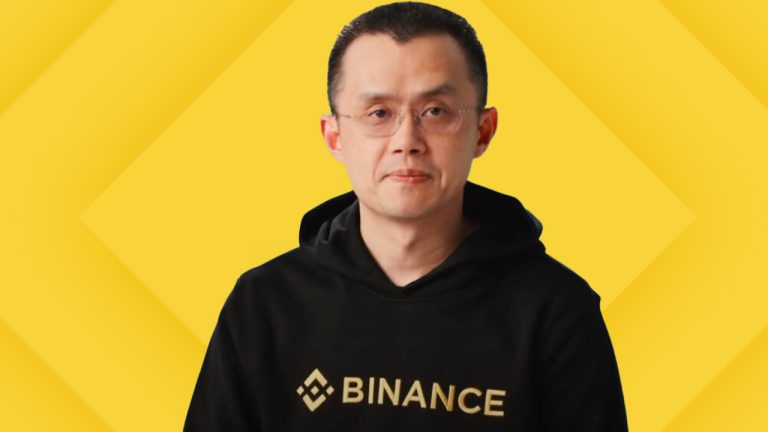
Binance founder and former CEO Changpeng Zhao is expected to be sentenced on April 30 after pleading guilty to money laundering in November 2023.
As the United States authorities are preparing to give a sentence to Binance founder Changpeng “CZ” Zhao on April 30, prosecutors have requested jail time for the former CEO.
Binance founder Zhao should serve 36 months in prison after pleading guilty to violating laws against money laundering, U.S. prosecutors said in a court filing on April 23.
“Given the magnitude of Zhao’s willful violation of U.S. law and its consequences, an above-guideline sentence of 36 months is warranted,” the prosecutors wrote in the filing to the U.S. district court for the Western District of Washington.

Binance founder and former CEO Changpeng Zhao is busy with a new project that aims to reduce the world’s illiteracy rate. In March, Zhao announced plans to launch the Giggle Academy, a platform that provides free education to the masses. In a new post on social media platform X, Zhao gives an update on the […]
The post Former Binance Head Changpeng Zhao Now Doing Dozens of Interviews per Week for New Project appeared first on The Daily Hodl.

A U.S. district court judge ordered former Binance CEO Changpeng Zhao to hand over his passports and travel documents as he awaits his sentencing in April. In November, Zhao pleaded guilty to violating anti-money laundering laws and stepped down from his role as chief executive of the world’s largest crypto exchange. Zhao has been free […]
The post Former Binance CEO Changpeng Zhao Forced To Surrender Passport to US Authorities Before Pretrial appeared first on The Daily Hodl.
 Binance Holdings is set to pay $4.3 billion in fines following the approval of its plea agreement with prosecutors by U.S. District Judge Richard Jones on Friday. Beyond the financial settlement, a third party will oversee Binance’s operations for a duration of five years. Historic $4.3 Billion Binance Settlement Approved by Seattle Judge Binance, the […]
Binance Holdings is set to pay $4.3 billion in fines following the approval of its plea agreement with prosecutors by U.S. District Judge Richard Jones on Friday. Beyond the financial settlement, a third party will oversee Binance’s operations for a duration of five years. Historic $4.3 Billion Binance Settlement Approved by Seattle Judge Binance, the […]
The founder and former chief executive of Binance, the world’s largest crypto exchange platform, has reportedly had his criminal sentencing postponed until April. According to a new report from CNBC, Changpeng Zhao’s (CZ) sentencing from charges brought forth by the U.S. Department of Justice, which claimed that the executive failed to maintain adequate anti-money laundering protocols, […]
The post Former Binance CEO Changpeng Zhao’s Criminal Sentencing Postponed Until April: Report appeared first on The Daily Hodl.

The Chair of the Commodities Futures Trading Commission (CFTC) says that former Binance CEO Changpeng Zhao will face prison in relation to recent charges. Speaking in a new CNBC interview, CFTC Chair Rostin Behnam says that he expects Zhao to spend time in prison after pleading guilty to failing to keep adequate anti-money laundering protocols […]
The post Binance’s Changpeng Zhao Will Be Going to Jail, Says CFTC Chair Rostin Behnam appeared first on The Daily Hodl.

This court “hereby accepts the guilty plea of the defendant to the charge [...] and the defendant is adjudged guilty of such offense,” wrote Judge Richard Jones.
A federal judge accepted Binance founder Changpang "CZ" Zhao's guilty plea to money laundering, but hasn't decided if he can leave the United States before his February sentencing date.
In a Dec. 6 filing to a Seattle District Court, Judge Richard Jones said he accepted Zhao’s guilty plea to one count of Bank Secrecy Act violations, which he submitted over two weeks ago on Nov. 21 alongside his exchange’s $4.3 billion settlement with the U.S.
As part of the settlement deal, Zhao agreed to step down as CEO of Binance and paid $150 million to regulators.

The new CEO of Binance takes stock of the exchange's future following a landmark $4.3 billion settlement with United States authorities in a one-on-one interview with Cointelegraph.
“As part of the settlement, CZ cannot be involved in the day-to-day running of the company’s operations,” Richard Teng explains.
Despite that, the incumbent CEO of Binance cuts the figure of a man reveling in the challenges ahead.
“I’m taking the baton and pushing ahead with our growth agenda while working very closely with global regulators.”
Teng believes that the “overcast” conditions clouding Binance in recent months are lifting following its staggering $4.3 billion settlement with the United States Justice Department relating to a raft of violations of U.S.
The exchange has paid dearly for mistakes made during its meteoric growth from 2017 onwards. Teng recalls how Zhao built Binance from a team of six people to a global operation consisting of thousands of employees that serves a user base estimated to be more than 166 million.
“In those very early days while we were building up the company, there were gaps in terms of compliance.
The shortcomings of its early compliance regime have led to the largest crypto-related settlement in U.S.
“U.S.
Binance is now left to shoulder the ongoing cost and scrutiny that its settlement with U.S. This includes a five-year monitorship and significant compliance undertakings to ensure “Binance’s complete exit from the United States."
Teng wouldn’t be drawn into the details of Binance.US’s ongoing legal battle with the U.S.

Global cryptocurrency exchange Binance paid one of the largest corporate fines in history for challenging the financial and political status quo in America, according to Arthur Hayes.
The explosive growth and success of Binance outside of the control of the traditional financial and political establishment led to heavy-handed enforcement actions against the exchange, according to former BitMEX CEO Arthur Hayes.
Hayes delved into the recent $4.3 billion settlement paid out by Binance in a lengthy Substack post. This comes after the exchange and its founder, Changpeng “CZ” Zhao, admitted violating United States laws around money laundering and terror financing.
As Hayes highlights, CZ’s global exchange became the largest by trading volume in the six years since its inception in 2017. The former BitMEX CEO points out that Binance would also be rated in the top 10 traditional exchanges by average daily volume, which is indicative of its growing influence on a global scale.
“The problem for the financial and political establishment was that the intermediaries facilitating flows into and out of the industrial revolution named blockchain were not run by members of their class,” Hayes opined.
The former BitMEX CEO, who himself fell foul of violating U.S. Bank Secrecy Act regulations after the exchange failed to implement adequate Know Your Customer procedures, highlighted Binance’s role in allowing everyday people to own intermediaries and cryptocurrency assets without needing traditional players.
“Never before had people been able to own a piece of an industrial revolution in under 10 minutes via desktop and mobile trading apps.”
Hayes added that from a fundamental standpoint, centralized exchanges use tools of the state, such as the company and legal structures to “disintermediate the very institutions that were supposed to run the global financial and political system.”
“How dearly did CZ pay? CZ — and by extension, Binance — paid the largest corporate fine in Pax Americana history.”
Hayes then refers to several high-profile mainstream banking scandals, as well as the 2008 global financial crisis and subsequent recession, which was directly attributed to the collapse of the U.S. housing market.
The US and China are kinda sorta friends again. How does this new found love translate into stacking sats? Read "Panda Power" for my take. Bonus feature: a small riff on the #BENANCE situation.https://t.co/ohSBPPhJyz pic.twitter.com/vKBPjMZ0Ce
— Arthur Hayes (@CryptoHayes) November 28, 2023
In most of these instances, mainstream banking and financial institutions were largely absolved or held to limited accountability. On the flip side, CZ and Binance were hammered hard by the U.S. Department of Justice:
“Obviously, the treatment of CZ and Binance is absurd, and only highlights the arbitrary nature of punishment at the hands of the state.”
Hayes then delves deeply into the intricacies of the current state of the U.S. and Chinese economies and how the latter could drive massive inflows of capital into Bitcoin in the next few years.
The former BitMEX CEO suggests that Chinese state-owned enterprises, manufacturers and investors are set to begin investing capital offshore due to a lack of attractive returns locally.
Quoting Peking University professor and former Bear Stearns trader Michael Pettis, Hayes writes that China cannot profitably absorb more debt due to the fact that investments do not yield returns that exceed the debt’s rate of interest.
“It gets punted in the financial markets instead. Capital, by which I mean digital fiat credit money, is globally fungible. If China is printing yuan, it will make its way into the global markets and support the prices of all types of risk assets,” Hayes explains.
Hong Kong’s recent approval of a handful of licensed cryptocurrency exchanges and brokers means that Chinese companies and individual investors have a means to purchase Bitcoin.
Given that China was once a powerhouse Bitcoin mining nation, Hayes suggests that many Chinese investors are well acquainted with the asset and its “promise as a store of value” and will
“If there is a way to legally move cash from the Mainland to Hong Kong, Bitcoin will be one of many risk assets that will be purchased.”
From a macro perspective, Hayes outlines an argument for China increasing the availability and affordability of Yuan-based credit locally. This in effect may lead to the price of Dollar-based credit to fall given that Chinese companies have an affordable domestic option.
“Given that the dollar is the world’s largest funding currency, if the price of credit falls, all fixed supply assets like Bitcoin and gold will rise in dollar fiat price terms.”
Hayes adds that the “fungible nature of global fiat credit” will lead to dollars flowing into hard monetary assets like Bitcoin.
Magazine: The truth behind Cuba’s Bitcoin revolution: An on-the-ground report

BTC's correction reveals a disconnect between pro traders' confidence and retail investors' skepticism amid regulatory shifts.
Bitcoin (BTC) briefly reached $38,000 on Nov. 24 but faced formidable resistance at the price level. On Nov. 27, Bitcoin price traded below $37,000, which is unchanged from a week ago.
What is eye catching is the unwavering strength of BTC derivatives, which signals that bulls remain steadfast with their intentions.
An intriguing development is unfolding in China as Tether (USDT) trades below its fair value in the local currency, the Yuan. This discrepancy often arises due to differing expectations between professional traders engaged in derivatives and retail clients involved in the spot market.
To gauge the exposure of whales and arbitrage desks using Bitcoin derivatives, one must assess BTC options volume. By examining the put (sell) and call (buy) options, we can estimate the prevailing bullish or bearish sentiment.

Since Nov. 22, put options have consistently lagged behind call options in volume, by an average of 40%. This suggests a diminished demand for protective measures—a surprising development given the intensified regulatory scrutiny following Binance's plewith the U.S. Department of Justice (DoJ) and the U.S. Securities and Exchange Commission's (SEC) lawsuit against Kraken exchange.
While investors may not foresee disruptions to Binance's services, the likelihood of further regulatory actions against exchanges serving U.S. clients has surged. Additionally, individuals who previously relied on obscuring their activity might now think twice, as the DoJ gains access to historical transactions.
Furthermore, it's uncertain whether the arrangement struck by Changpeng “CZ” Zhao with authorities will extend to other unregulated exchanges and payment gateways. In summary, the repercussions of recent regulatory actions remain uncertain, and the prevailing sentiment is pessimistic, with investors fearing additional constraints and potential actions targeting market makers and stablecoin issuers.
To determine if the Bitcoin options market is an anomaly, let's examine BTC futures contracts, specifically the monthly ones—preferred by professional traders due to their fixed funding rate in neutral markets. Typically, these instruments trade at a 5% to 10% premium to account for the extended settlement period.

Between Nov. 24 and Nov. 26, the BTC futures premium flirted with excessive optimism, hovering around 12%. However, by Nov. 27, it dipped to 9% as Bitcoin's price tested the $37,000 support—a neutral level but close to the bullish threshold.
Moving on to retail interest, there is a growing sense of apathy due to the absence of a short-term positive trigger, such as the potential approval of a spot Bitcoin exchange-traded fund (ETF). The SEC is not expected to make its final decision until January and February 2024.
The USDT premium relative to the Yuan hit its lowest point in over four months at OKX exchange. This premium serves as a gauge of demand among China-based retail crypto traders and measures the gap between peer-to-peer trades and the U.S. dollar.

Since Nov. 20, USDT has been trading at a discount, suggesting either a significant desire to liquidate cryptocurrencies or heightened regulatory concerns. In either case, it's far from a positive indicator. Furthermore, the last instance of a 1% positive premium occurred 30 days ago, indicating that retail traders aren't particularly enthused about the recent rally toward $38,000.
Related: What’s next for Binance’s Changpeng ‘CZ’ Zhao?
In essence, professional traders remain unfazed by short-term corrections, regardless of the regulatory landscape. Contrary to doomsday predictions, Binance's status remains unaffected, and the lower trading volume on unregulated exchanges may boost the chances of a spot Bitcoin ETF approval.
The disparity in time horizons may explain the divide between professional traders and retail investors' optimism. Additionally, recent regulatory actions could pave the way for increased participation by institutional investors, offering a potential upside in the future.
This article is for general information purposes and is not intended to be and should not be taken as legal or investment advice. The views, thoughts, and opinions expressed here are the author’s alone and do not necessarily reflect or represent the views and opinions of Cointelegraph.